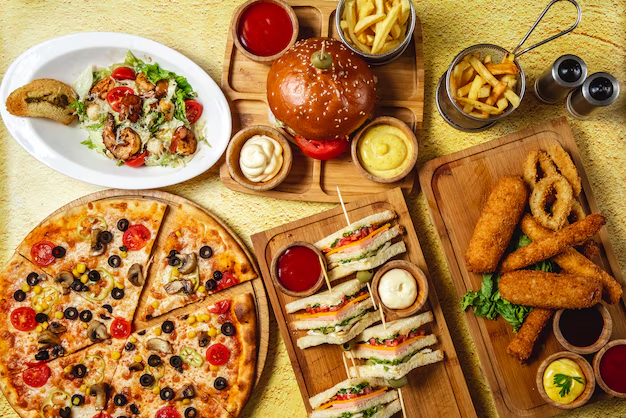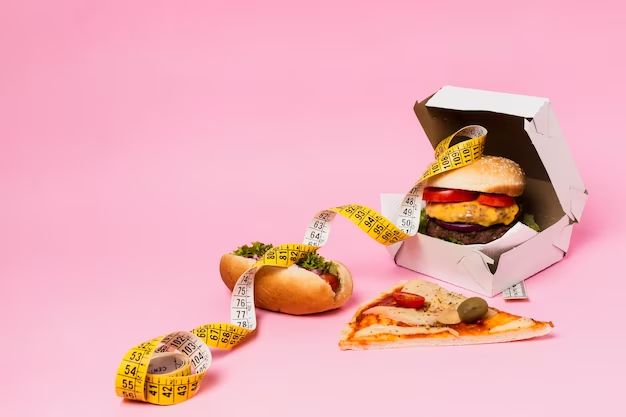Fast food has become a global phenomenon. Its convenience and taste make it irresistible for many. However, for those aiming to lose weight, the role of fast food sparks debates. Is fast food bad for weight loss? This question arises as fast food is often high in calories, sugar, and unhealthy fats.
While it’s tempting to blame fast food entirely, enjoying it occasionally and with the right choices might not sabotage weight loss goals. This article explores the impact of fast food on weight loss, strategies for moderation, and healthier alternatives. Let’s dive into an evidence-based analysis of this popular dilemma.
Why Is Fast Food Bad for Weight Loss?
Here are some potent reasons that make fast food bad for weight loss.
High Calories, Low Nutrient Density
Fast food is notorious for being calorie-dense. A single meal often contains over 1,000 calories, nearly half the daily caloric requirement for an average adult. For instance, a burger with fries and soda can easily exceed this limit.
These meals lack essential nutrients like vitamins, fiber, and lean protein, which are vital for a balanced diet. Consuming more calories than your body needs results in fat accumulation, hindering weight loss.
Excess Sugar and Carbohydrates
Fast food is often loaded with refined sugars and simple carbohydrates. These components cause a rapid spike in blood sugar levels. This triggers the release of insulin, a hormone that promotes fat storage.
Over time, constant sugar spikes can lead to insulin resistance, making it harder to lose weight. For example, sugary sodas and desserts are particularly harmful due to their empty calorie content.
Saturated Fats and Metabolism
Most fast food items are cooked using unhealthy oils rich in saturated fats. Consuming excess saturated fat slows down your metabolism. It also increases the risk of obesity-related conditions like heart disease and diabetes.
Trans fats, commonly found in fried items, further impair your body’s ability to burn fat effectively. This makes it even more challenging to achieve weight loss goals.
Can You Eat Fast Food and Still Lose Weight?
When targeting weight loss, you must consider the considerations mentioned below before eating fast food.
Portion Control
Yes, you can eat fast food and still lose weight, but portion control is crucial. Instead of supersizing your meal, opt for smaller portions. For example, order a small burger or share fries with a friend. Controlling portion sizes helps reduce calorie intake while allowing you to enjoy your favorite foods.
Low-Calorie Options
Many fast food chains now offer low-calorie options. Salads, grilled chicken, or veggie wraps are better choices than fried items. Check for meals under 500 calories, and avoid adding high-calorie dressings or sides.
Avoid High-Fat and Sugary Items
Steer clear of creamy sauces, fried items, and sugary drinks. Opt for water or unsweetened tea instead of soda. This simple switch can save hundreds of calories.
How Often Can You Eat Fast Food on a Diet?

Eating fast food occasionally—once a week or less—is unlikely to derail your progress. Consistency is key when it comes to weight loss. Balancing fast food indulgence with nutrient-rich meals throughout the week ensures you stay on track.
Comparing Fast Food and Healthy Alternatives
Let’s compare fast food with healthy alternatives.
Nutritional Profiles
Fast food generally lacks balance. It’s high in calories, unhealthy fats, and sugars, but low in fiber and protein. In contrast, healthy alternatives like whole grains, lean protein, and fresh vegetables offer a better balance of macronutrients and support weight loss.
For instance, a homemade quinoa bowl with grilled chicken and veggies is more filling and nutritious than a fast food burger.
| Nutrient | Fast Food (Burger Meal) | Healthy Alternative (Grilled Chicken Salad) |
| Calories | 1,200+ | ~400 |
| Protein | 25g | 35g |
| Fiber | 3g | 8g |
| Saturated Fats | High | Low |
Healthier Options While Eating Out
Many fast-food chains now include healthier items on their menus. Opt for grilled chicken sandwiches, salad bowls, or yogurt parfaits instead of fried chicken or burgers. These options are lower in calories and provide more nutrients.
The Role of Meal Prep
Meal prep is an excellent alternative to fast food. Preparing your meals in advance ensures you control ingredients and portion sizes. You can include plenty of vegetables, lean proteins, and whole grains, which are essential for weight loss. Pre-packed meals also save time and money, making it easier to avoid the temptation of fast food.
To Read: Is McDonald’s Breakfast Healthy?
Low-Calorie Options at Fast Food Restaurants
Eating fast food doesn’t mean sacrificing your health. Most chains now offer lighter options under 500 calories. Look for meals that prioritize grilled proteins, fresh vegetables, and whole grains. For example:
- Grilled Chicken Sandwiches: Opt for grilled instead of fried. Pair it with a side salad instead of fries.
- Salads with Lean Proteins: Many chains offer salads topped with grilled chicken, shrimp, or even plant-based proteins.
- Veggie-Focused Bowls: Burrito bowls and Mediterranean-inspired dishes often come packed with veggies and lean proteins.
Pay close attention to the nutrition facts displayed in menus or online. Chains like Chipotle, Panera, and Subway make it easy to customize meals to meet your calorie needs.
What Is the Healthiest Fast Food for Weight Loss?
Sticking to your weight loss plan at a fast-food restaurant can be easier than you think. Some great low-calorie options include:
- McDonald’s: Try the Egg McMuffin or a six-piece Chicken McNugget with apple slices.
- Chick-fil-A: Go for the Grilled Chicken Sandwich or Grilled Nuggets with a fruit cup.
- Taco Bell: The Power Bowl (chicken or steak) is a customizable, nutrient-packed choice.
- Starbucks: Pair an Egg White & Roasted Red Pepper Sous Vide Egg Bite with a tall black coffee.
These meals are not only low in calories but also provide a good balance of protein, fiber, and essential nutrients.
Tips for Avoiding High-Calorie Add-Ons
The hidden calorie traps in fast food lie in the extras. Here’s how to avoid them:
- Skip the Fries: A medium order of fries can add 300–400 calories. Swap them for a side salad or apple slices.
- Watch Out for Beverages: Sugary drinks like sodas and milkshakes are packed with empty calories. Opt for water, unsweetened iced tea, or a zero-calorie soda.
- Say No to Super-Sizing: Larger portions might seem like a deal, but they come with unnecessary calories and sodium.
Choosing smaller portions or skipping add-ons entirely can make a huge difference in keeping your meal light and nutritious.
How Does Fast Food Affect Metabolism and Cravings?
Fast food often contains trans fats, refined sugars, and processed carbohydrates. These ingredients can:
- Slow Your Metabolism: Processed carbs cause blood sugar spikes and crashes, which may reduce your energy expenditure over time.
- Increase Fat Storage: Trans fats, found in fried and processed items, are linked to increased belly fat and reduced calorie-burning efficiency.
Sticking to whole, nutrient-dense options can help your metabolism stay more active.
Understanding Fast Food Cravings
Fast food is engineered to be addictive. High levels of sugar, fat, and salt activate your brain’s reward system, leading to frequent cravings. Additives like MSG can enhance these effects, making it harder to stop after one meal.
To combat cravings, try eating smaller meals throughout the day to keep your blood sugar stable. When your body is nourished with whole foods, cravings naturally decrease.
Managing Cravings for Fast Food During Weight Loss

Curbing fast food cravings doesn’t mean depriving yourself. Here are some practical tips:
- Stay Hydrated: Thirst is often mistaken for hunger. Drinking water before meals can reduce the urge to overeat.
- Snack Smart: Keep nutrient-dense snacks on hand, like nuts, fruit, or yogurt, to prevent impulse purchases.
- Plan Ahead: Know what healthier options are available at your go-to fast-food chains so you can order confidently.
Balancing indulgence with healthier choices will help you stay on track without feeling deprived.
Breaking the Fast Food Habit and Avoiding It for Weight Loss
Reducing fast food consumption comes with a host of health benefits:
- Improved Digestion: Processed foods can lead to bloating and discomfort, while fresh foods support gut health.
- Increased Energy: Whole foods provide sustained energy, unlike the sugar crashes associated with fast food.
- Weight Management: Avoiding high-calorie, low-nutrient meals makes it easier to maintain a healthy weight.
Breaking the habit isn’t about eliminating fast food completely but making it an occasional treat rather than a daily staple.
Strategies for Avoiding Fast Food
Building healthier habits is easier with actionable steps:
- Meal Prep: Prepare meals and snacks in advance so you’re less tempted by convenience food.
- Mindful Eating: Recognize emotional triggers for fast food cravings and address them with healthier alternatives.
- Have a Backup Plan: If you must eat out, research menus beforehand to identify the healthiest options.
Small changes can lead to a big impact over time.
The Role of Accountability in Weight Loss Success
Sticking to healthy eating is easier with support. Consider these strategies:
- Partner Up: Share your goals with a friend or family member who can encourage you.
- Track Your Progress: Use apps or journals to monitor meals and identify patterns.
- Join Communities: Online forums, weight loss groups, or local fitness classes can provide motivation and accountability.
FAQs
1. Is it okay to eat KFC once a month?
Yes, eating KFC once a month is unlikely to affect weight loss if balanced with a healthy diet. Opt for grilled chicken and avoid high-calorie sides to minimize the impact.
2. Is junk food once a week ok?
Consuming junk food once a week in moderation can fit into a weight loss plan. Balance it with nutritious meals and avoid overeating during the week to maintain progress.
3. Is McDonald’s bad for weight loss?
McDonald’s can hinder weight loss if meals are calorie-dense and nutrient-poor. Opt for smaller portions, salads, or grilled options to minimize its impact on your diet.
4. Can you eat fast food and stay in shape?
Yes, staying in shape while eating fast food is possible by choosing healthier menu options, watching portion sizes, and incorporating regular physical activity into your lifestyle.
5. Is Subway good or bad for weight loss?
Subway can support weight loss if you select whole-grain bread, lean protein, and plenty of veggies while avoiding high-calorie sauces and processed meats.
6. Is Taco Bell healthy for weight loss?
Taco Bell can offer low-calorie options for weight loss, such as the Fresco menu. Avoid fried items, creamy sauces, and sugary beverages to keep meals diet-friendly.
Conclusion
So, is fast food bad for weight loss? The answer lies in how you approach it. While fast food is often high in calories, unhealthy fats, and sugar, enjoying it in moderation with smart choices can fit into a weight loss plan. Opting for low-calorie options, avoiding oversized portions, and balancing your diet with nutrient-rich meals can minimize its impact.
However, breaking the fast food habit entirely provides numerous benefits, including improved metabolism, better digestion, and fewer cravings. The key to success is moderation, mindful eating, and making healthier choices consistently.

